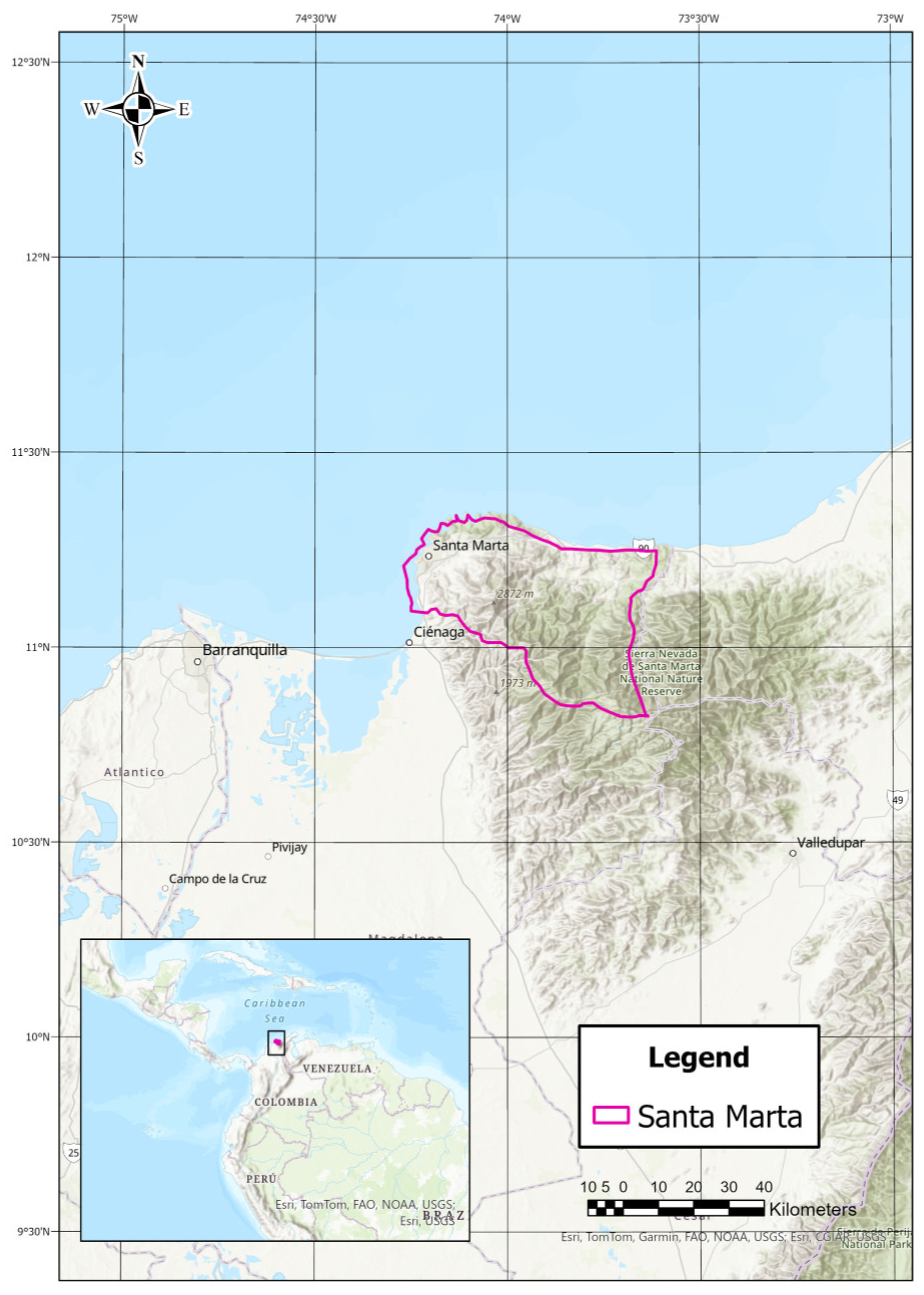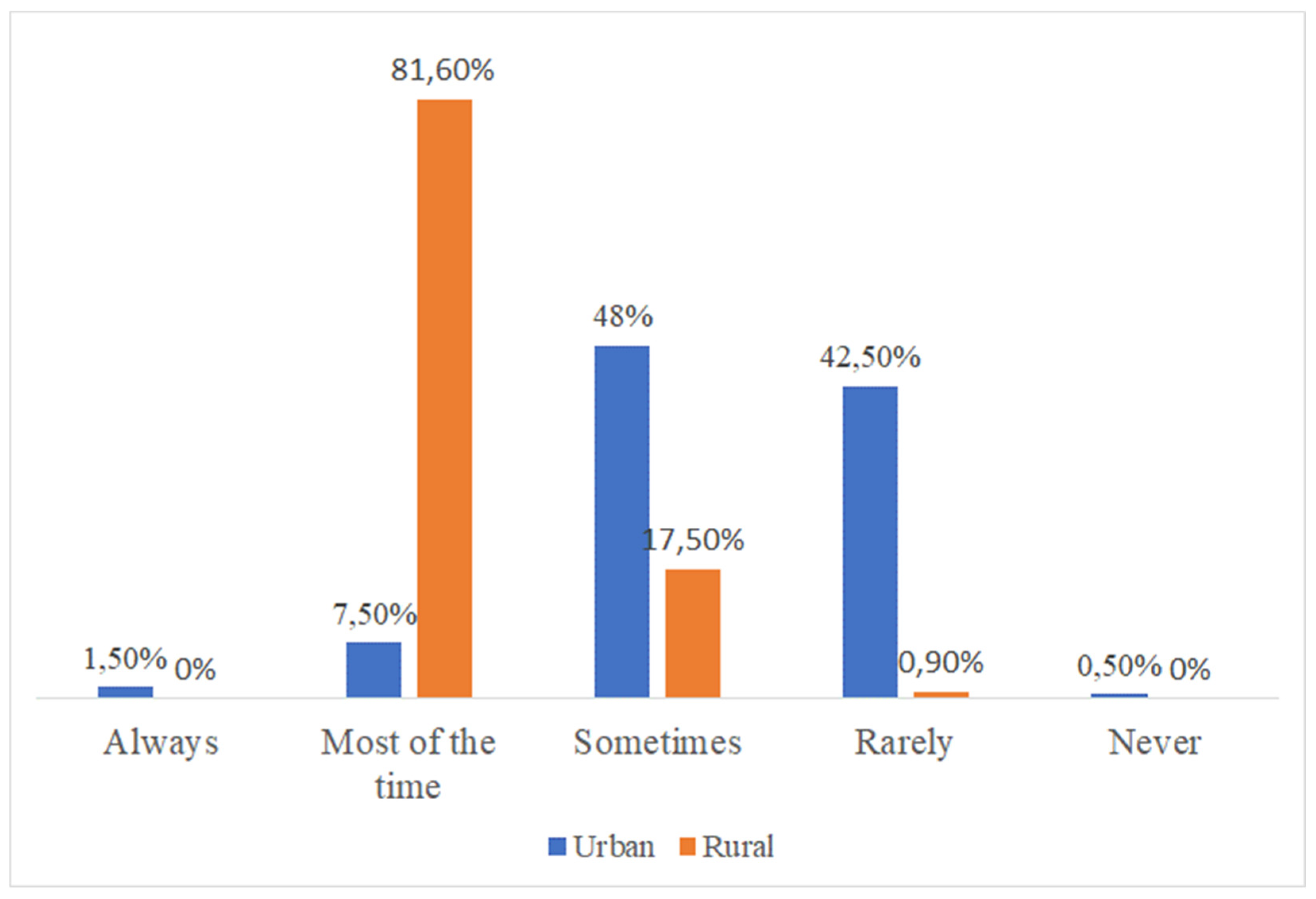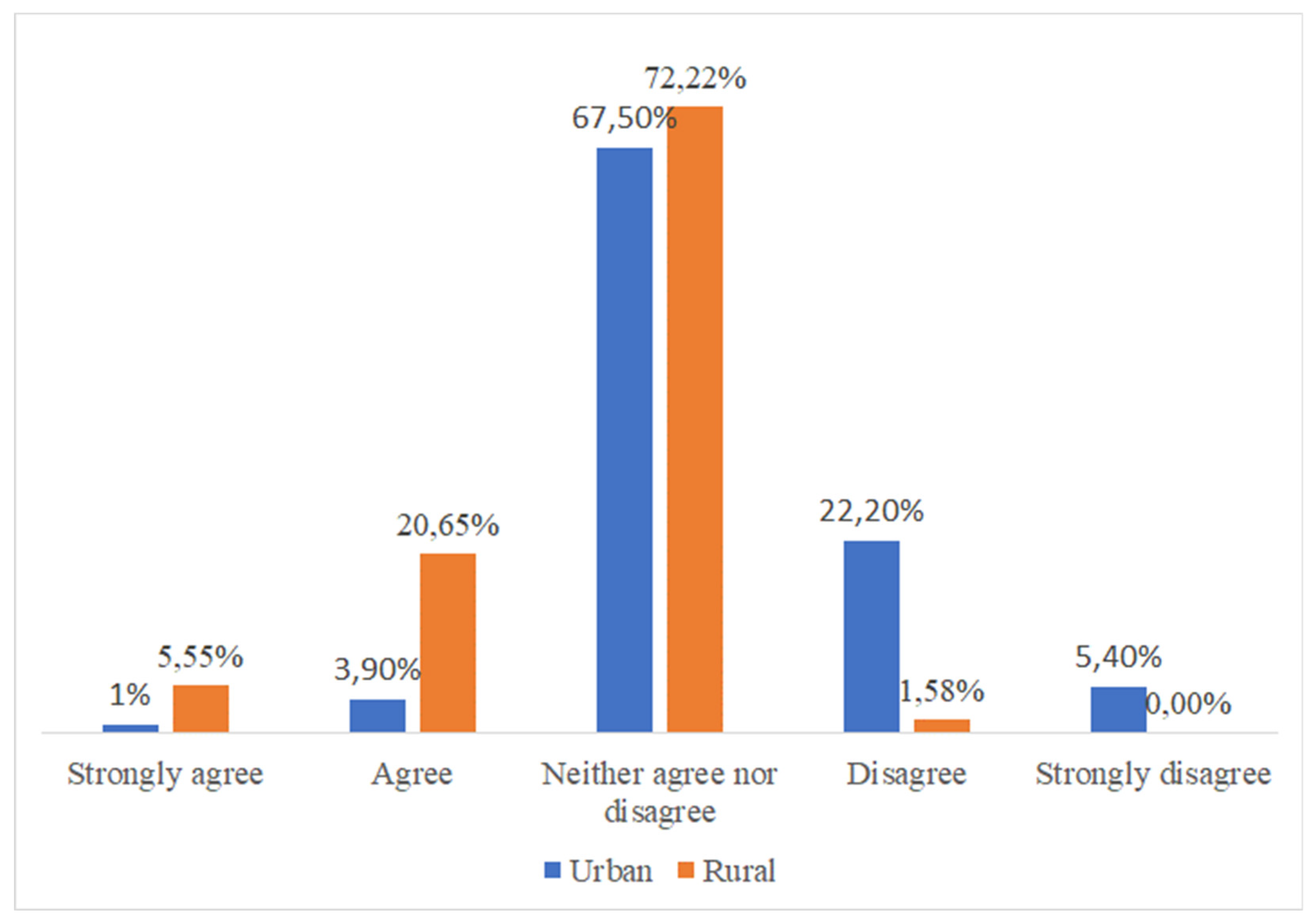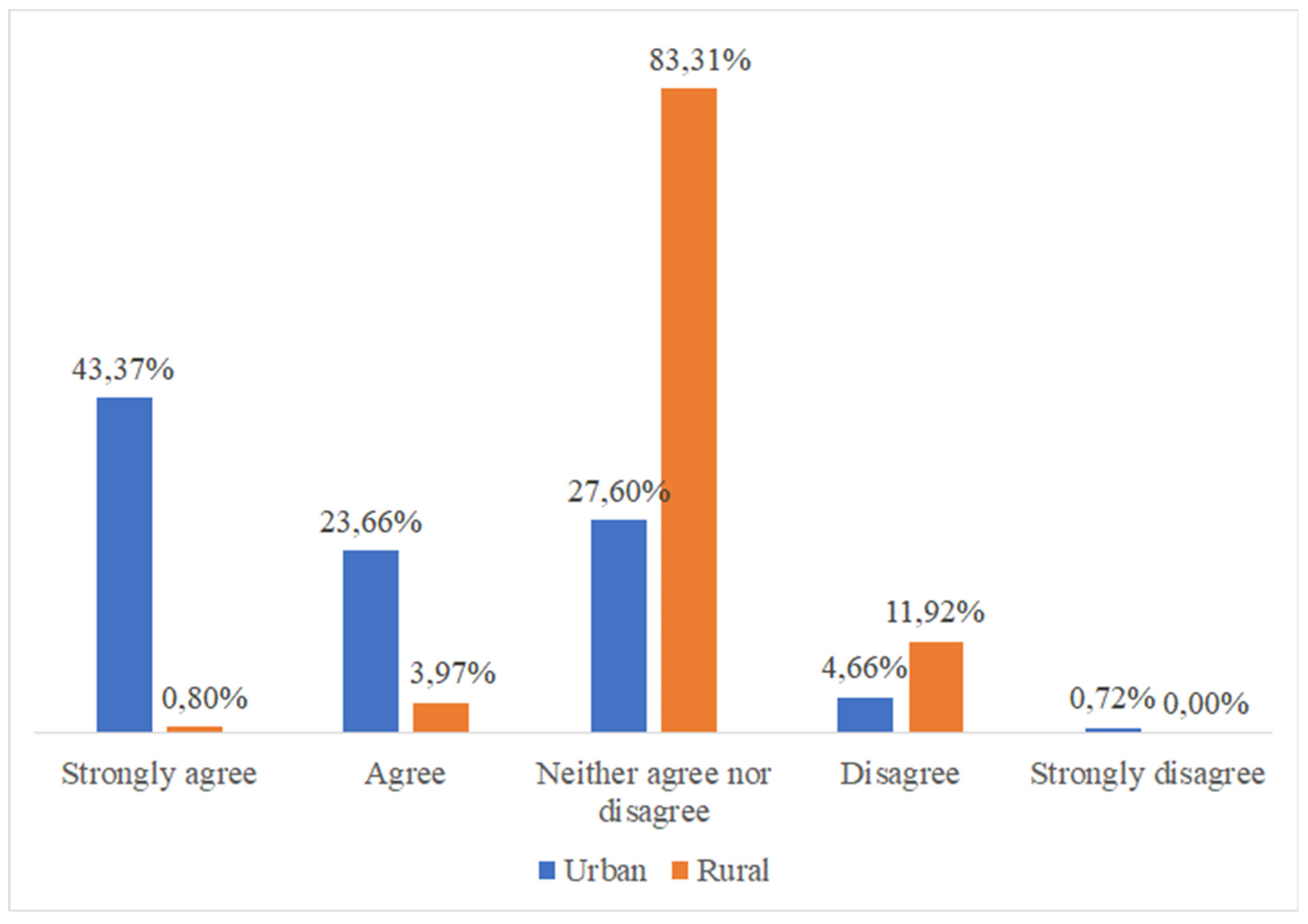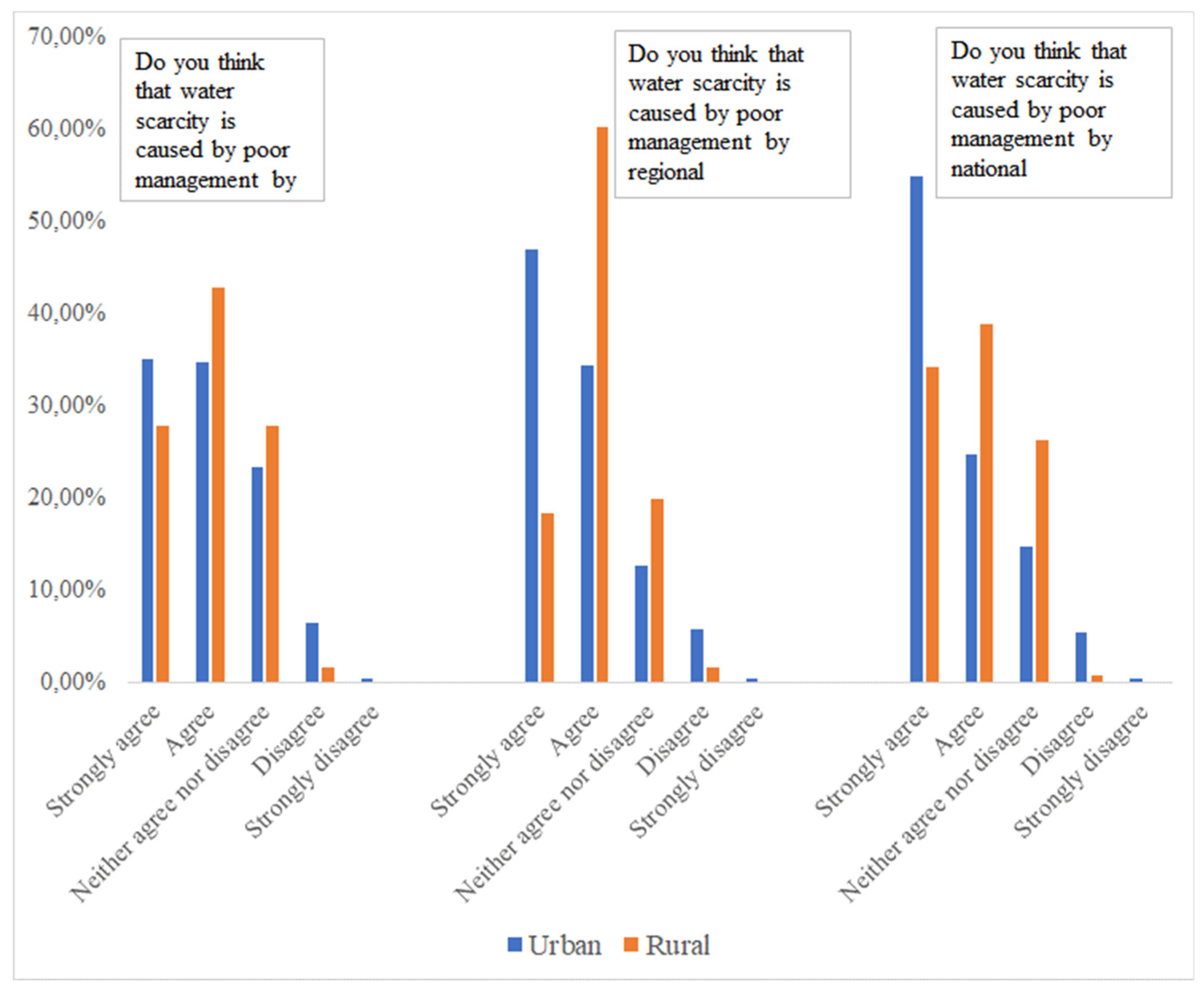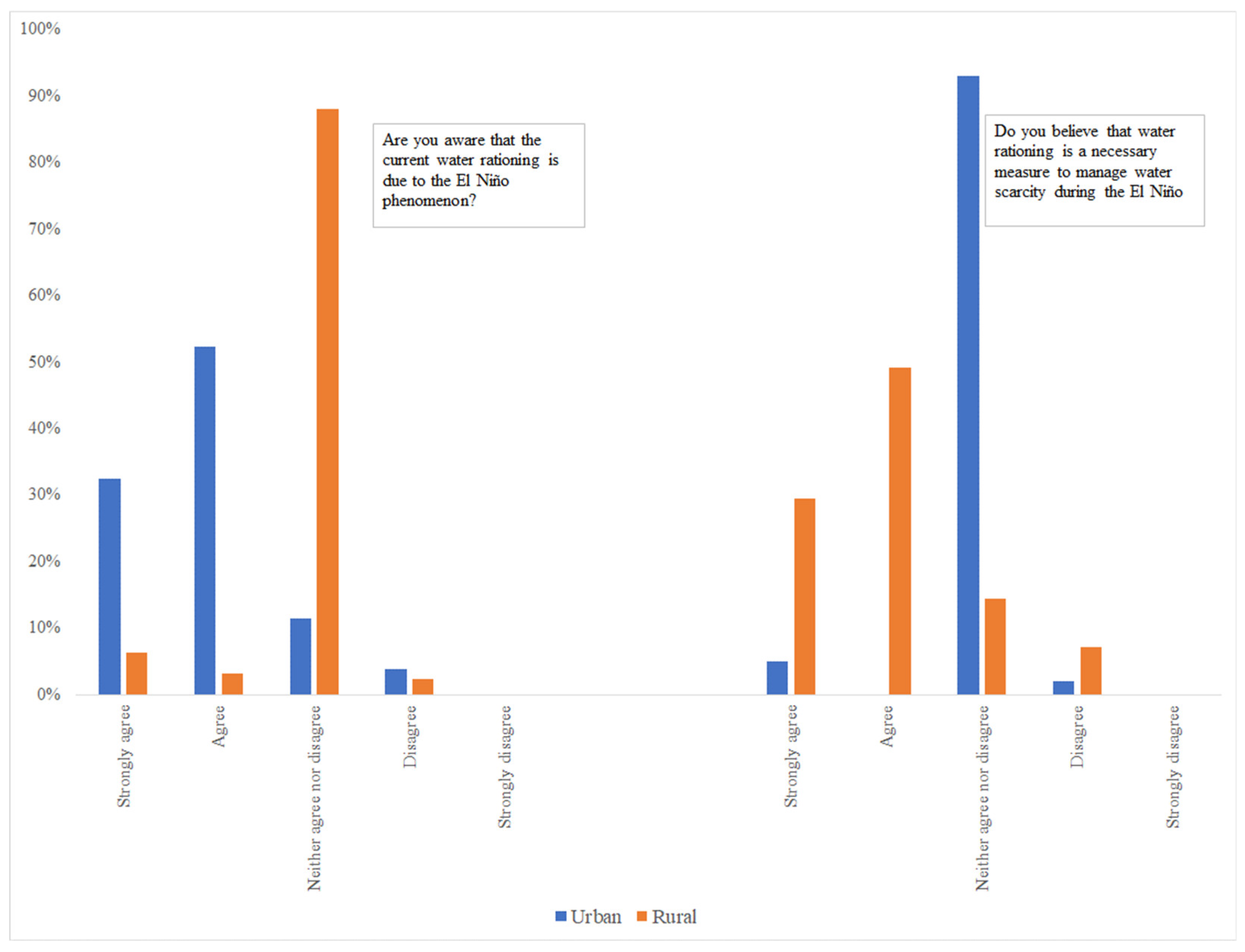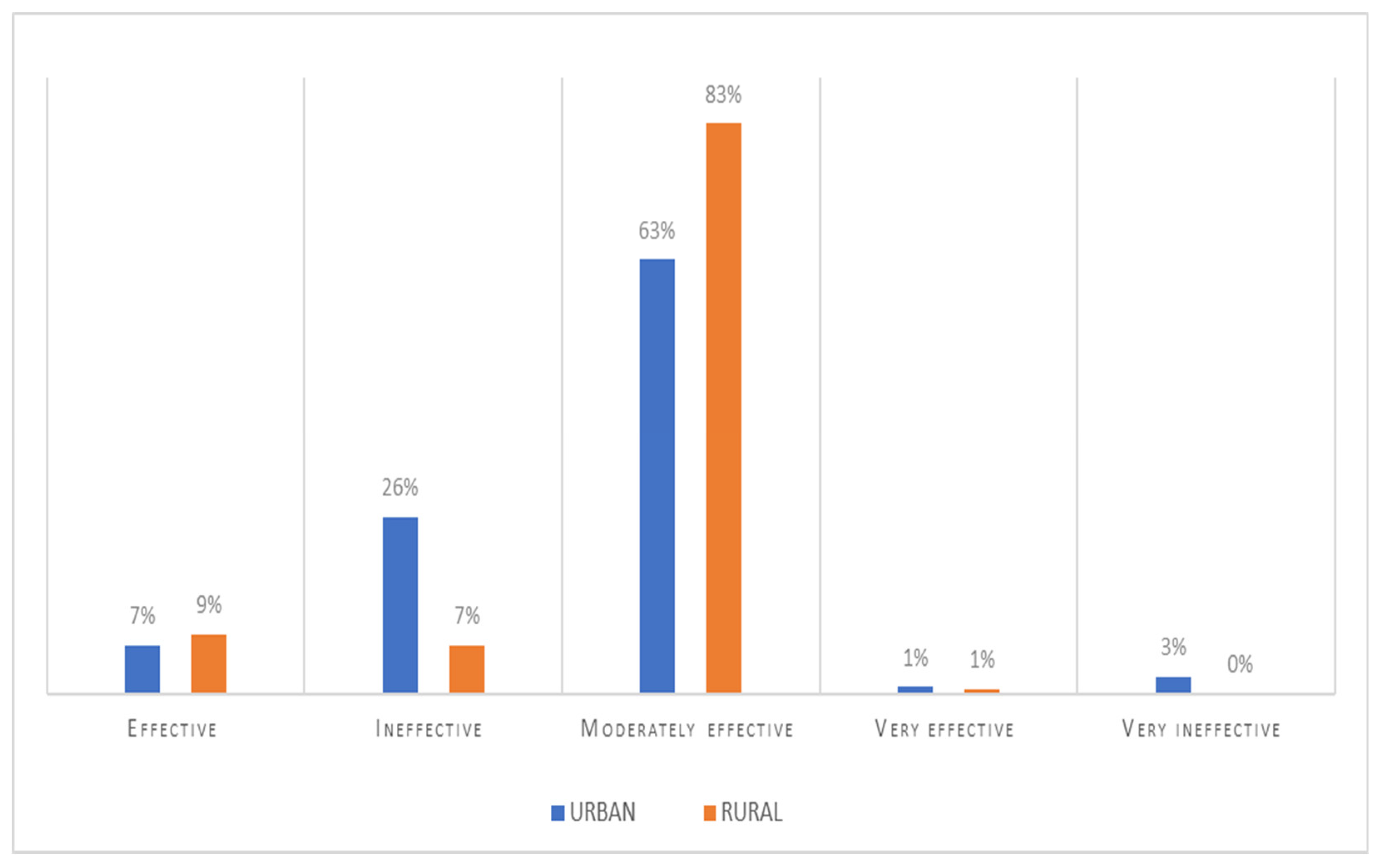1. Introduction
The climate of South America has a strong connection with El Niño, which was historically associated with unusually warm sea-surface temperatures off the coast of Peru. Throughout South America, there is a significant and regionally diverse relationship between precipitation, temperature fluctuations, and the El Niño–Southern Oscillation. For instance, no region suffers more radical and frequent El Niño impacts than Latin America [
1,
2,
3,
4,
5,
6]. In South America, one of the countries most strongly impacted by the ENSO episode is Colombia [
7,
8,
9,
10,
11,
12]. El Niño often introduces droughts, the strongest of which occurred in Colombia during the El Niño years of 1997-1998, 1991-1992, 1982-1983, 1976-1977, and 1987-1988. As of April 2024, about ten million residents of the Colombian capital Bogota are being forced to ration water amid crippling shortages due to a severe drought caused by the El Niño period [
13]. While scientific approaches provide tools to understand and manage water resources, addressing water scarcity effectively also requires a deep understanding of public perceptions and local socio-cultural dynamics [
14,
15,
16]. Perceptions of scarcity, which are influenced heavily by risk perception research, play a critical role in shaping public responses to water management strategies. Such research highlights the importance of trust in determining public acceptance or rejection of new technologies and management practices [
17,
18]. Despite increasingly recognizing the need to integrate socio-cultural perspectives into climate-related policy development, significant gaps remain. For example, there is an ongoing need to weave local cultural and cognitive systems more tightly into our frameworks for understanding and responding to climate change risks, particularly in relation to water scarcity [
19]. Water management is an increasingly complex social issue that must handle the divergent opinions of local stakeholders. Furthermore, political strategies often require significant interventions that alter the environments of local inhabitants [
20]. Under this background, the integration of diverse stakeholders has become an essential part of sustainable water resource management [
21,
22,
23,
24,
25].
Approaching this phenomenon through Bourdieu’s theory of social fields and habitus offers a clearer perspective on why water scarcity is perceived differently among various social groups. Bourdieu’s theory emphasizes that individuals’ perceptions and practices are shaped by their habitus (dispositions, perceptions, and appreciations), the capital (economic, cultural, and social) they possess, and their positions within social fields [
26]. These elements interact to form specific viewpoints and responses to water scarcity.
Bourdieu developed the concept of Social Fields as relatively autonomous social spaces where specific activities take place [
27], identifying power positions among actors, their relationships, and their interdependence. Bourdieu emphasized that individuals are active social agents with the capacity to transform social structures, recognizing their agency in implementing strategies to modify or change pre-established structures. This perspective is crucial for understanding how different community actors perceive and engage with water management practices.
The concept of Habitus refers to a set of structured practices, skills, and dispositions that persist over time, associated with tacit norms and principles that organize social life and guide the generation of new practices [
28]. These perception- and action-based schemes are deeply rooted in individuals and acquired through their life history. In the context of water management, habitus shapes how water scarcity is perceived by communities based on their historical interactions with water resources, cultural norms, and economic activities. Habitus tends to reproduce the material conditions that originated it, promoting the conservation of entrenched social structures to preserve and transmit social capital. These perception and action schemes help interpret aspects of social reality, including water management practices.
The neoliberal model has significantly influenced urban planning by shaping the habitus of urban planners to align with rent-seeking objectives. This practice has led to a situation where planners, even those aware of neoliberalism’s issues, struggle to propose alternatives beyond its boundaries [
29].
The analysis then focuses on how access to and control of water resources within a social field represent a power struggle over water use and management, involving various actors (government, companies, and local communities) competing for resource management. In this field, rules are established, and a constant power struggle is evident, where actors with greater economic and social capital dominate the control of water resources. This situation generates wide social gaps and inequalities in water access and distribution.
Public opinions play a crucial role in shaping policies and practices in the field of water management. Bourdieu and Delsaut’s analysis of Quattrocento’s view of art [
30], which highlights the influence of socio-economic conditions on the appreciation and value placed on artwork, investigates how similar frameworks impact communities’ understanding and responses to water scarcity. This sociological approach allows water scarcity to be viewed not only as a physical condition but as a socially constructed phenomenon influenced by historical, cultural, and economic factors.
The main objective of this study is to explore and understand community perceptions of water scarcity during the El Niño-induced drought period in Colombia. The focus is on the municipality of Santa Marta, known for struggling with water scarcity. This understanding is crucial for developing water management strategies that are effective, culturally resonant, and accepted by the local population. By gaining better insight into how the community perceives and responds to water scarcity, water agencies and policymakers can improve their communication of necessary interventions and foster closer collaboration with the community. This, in turn, is essential to ensure the successful implementation of measures that promote the conservation and sustainable management of water resources.
2. Literature Review
The global significance of drought as a climatic phenomenon is pronounced, with notable impacts on agricultural productivity and socio-economic development, particularly in rural areas. Research from Northeast Ethiopia [
31] shows that household perceptions of drought critically influence their livelihood strategies, demonstrating the complex interplay between local adaptive responses and perceived climatic variations. This factor highlights the need to understand local perceptions for effective resilience-building because individuals’ actions are deeply rooted in their personal views, knowledge, cultures, and attitudes toward environmental changes. A study conducted in Indonesia [
32] found that even though drought forecasts play a crucial role in society, they are not widely utilized by households, and there is low confidence in their accuracy. This disconnect emphasizes a larger issue regarding the effectiveness of communicating scientific predictions for local use, which has a direct impact on agricultural practices and outcomes during periods of drought. In Southern Africa [
33], although advanced tools are available to predict droughts and manage water resources, there is a significant gap in the utilization of this information to make effective decisions regarding water distribution.
According to research conducted in Maharashtra, India [
34], although people are generally aware of the serious consequences of drought in different socio-economic areas, there is significant discontent with the government’s efforts to mitigate these effects. This inequality highlights the pressing need for policies that not only resolve the immediate repercussions of drought but also align closely with the cultural and socio-economic environments of the communities affected.
Understanding how people perceive natural resources is crucial for promoting sustainable environmental behaviors. Research conducted in Western Europe [
35] investigated the impact of people’s perceptions on water as a distinct natural resource on their actions towards conservation. The study revealed that these perceptions increase the significance placed on water, thus intensifying the ethical responsibility to participate in conservation activities. This result indicates that increasing public consciousness about the inherent value of water may encourage more environmentally friendly water utilization behaviors.
Husu [
36] applied Bourdieu’s conceptual framework to understand how social structures, power dynamics, and cultural practices influence responses to environmental challenges in energy transition. Similarly, in the context of water management, cultural, symbolic, and social capital—understood as non-financial assets, social networks, and connections—shape communities’ perceptions and actions towards water scarcity. Ternes and Donovan [
37] explored how water supply systems, such as private wells and municipal supplies, influence water consumption habits in Kansas. Using Pierre Bourdieu’s concept of “habitus,” the authors analyzed how water infrastructure and social variables like class and geographic location shape water use practices. The findings suggest that well owners tend to use more water, especially during droughts, reflecting a “hydrologic habitus” linked to their social position and access to resources.
The concept of social capital has also been applied in the context of sustainable development. For example, Klapper et al. [
38] explored the relationship between social capital, resource constraints, and low-growth communities, focusing on lifestyle entrepreneurs in Nicaragua. This previous study examined how social capital can substitute for manufactured and natural capital in resource-limited environments, highlighting the significance of social networks and the coping strategies used by entrepreneurs to navigate resource constraints. Drawing on Bourdieu’s concept of social capital, the study explored the implications of these practices for sustainability. The findings suggest that while social capital can effectively replace other forms of capital in certain contexts, its broader applicability may be limited, particularly in more affluent, consumer-oriented societies. Rahimi-Feyzabad et al. [
39] investigated the intentions and behaviors of water conservation among farmers in western Iran, using Bourdieu’s cultural capital theory. The analysis found that embodied and observable cultural capital significantly influenced farmers’ intentions, while institutionalized cultural capital, observable cultural capital, intention, and family experiences predicted their behavior. The study determined that cultural capital can effectively explain farmers’ willingness and behavior, marking the first quantitative application of this model.
These studies emphasize the importance of considering local and regional perceptions in managing drought and water scarcity. They suggest that incorporating these perceptions into policies could improve the effectiveness of water conservation initiatives and drought management strategies.
3. Materials and Methods
3.1. Study Area
Santa Marta in Colombia’s Magdalena region (
Figure 1) experiences significant water supply challenges, with demand exceeding available supply by nearly 30% on average. During dry seasons, this shortfall can worsen to about 60% [
40]. Decreased rainfall and lower flow rates further exacerbate the city’s vulnerability to water scarcity. Santa Marta is among the seven areas in Magdalena that periodically declares a public calamity due to water issues, which particularly affect urban zones [
41].
3.2. Research Design
Surveys were conducted between April and May 2024 in Santa Marta, Magdalena, to understand the perception of water scarcity among resident urban and rural communities. The sample size was calculated based on a population of 560,000 inhabitants to achieve a representative survey with a confidence level of 95% and a margin of error of 5% [
42]. Although the target number was set at 384 surveys, a total of 405 surveys were conducted. The first section of the survey sought to characterize the respondents according to their area and sociodemographic conditions, including age, presence in an urban or rural population, social stratification, educational level, and gender. The second part of the survey included questions about water scarcity, such as whether water reaches people’s homes throughout the year and if there is enough water for the entire community in the area. The survey also aimed to assess perceptions regarding management of this resource, as follows: “Do you think water scarcity is due to poor management by local, regional, or national government? And do you believe that mismanagement of water utility companies contributes to water scarcity?” Finally, questions related to the El Niño phenomenon were asked: “Are you aware that current water rationing is due to the El Niño phenomenon? Do you think rationing is a necessary measure during El Niño? How would you rate authorities’ communication regarding the reasons for rationing and how it’s managed?” The questions were presented on a five-point Likert scale with exclusive response options ranging from 1 (strongly disagree) to 5 (strongly agree).
Data collection was conducted using the SurveySparrow application, which generates a shareable link that can be distributed via social media platforms. This approach facilitated broad dissemination of the survey, allowing for efficient data gathering across various regions. However, recognizing the potential limitations of digital access in rural areas, the research team employed a more direct method of data collection. In these cases, a member of the team traveled to rural locations with a mobile device and personally administered the survey. This dual approach ensured comprehensive reach, capturing responses from both urban and rural populations and addressing potential accessibility issues.
3.3. Data Analysis
This study analyzed the perceptions of 405 individuals regarding water scarcity, water management, and the El Niño Southern Oscillation phenomenon. The data were collected using a Likert scale [
43], a common method in social science research for measuring attitudes or perceptions [
44,
45,
46,
47]. To prepare the data for statistical analysis, the Likert scale responses were transformed using square root transformations. This step was necessary to ensure the data met the assumptions required for the subsequent statistical tests, particularly in addressing non-normal distributions and stabilizing variances across the data set. Following data transformation, a Bray–Curtis similarity matrix was calculated for each of the three response variables. The Bray–Curtis index is widely used in research across various disciplines to assess similarities or differences between samples based on their composition [
48,
49,
50,
51]. In this study, this index was used to evaluate the degree of similarity in perceptions across different respondents. The Bray–Curtis matrix is well-suited for this type of analysis as it can handle zero values and does not require the assumption of multivariate normality, making it appropriate for interrogating social survey data.
A multivariate analysis of variance with type III partial sum of squares and permutation (Permanova) of residuals under a reduced model was conducted for each perception variable using 9999 permutations [
52]. The experimental design included two factors: urban or rural population (with urban and rural as levels) and gender (with male and female as levels), along with their interactions [
53,
54]. This routine was run in the PRIMER v7 and PERMANOVA+ programs [
52,
55].
The experimental design incorporated two main factors: population type (urban vs. rural) and gender (male vs. female), as well as the interaction between these factors. This factorial design allowed us to examine not only the main effects of population type and gender on the response variables but also the interaction effects between these factors.
4. Results
Ultimately, 279 surveys were carried out in the urban area, representing 68.9% of the total; while in the rural area, 126 surveys were conducted, equivalent to 31.1% of the sample obtained. Among those surveyed, 274 were women (67.5%), and 131 were men (32.50%). The gender distribution shows that a majority of respondents were female with 67.5% of the total, offering an additional perspective on how water scarcity affects men and women differently in Santa Marta.
4.1. Water Scarcity Perception
In the context of water scarcity perception, significant statistical differences were found between urban and rural population (Pseudo-F=98.572; p-perm=0.001), while no differences emerged between genders (Pseudo-F=2.9; p-perm=0.06) or in the interaction of gender by urban or rural population (Pseudo-F=0.45; p-perm=0.63). In the urban area, for the question “Does water reach your home throughout the year?”, the predominant responses were ‘sometimes’ (48%) and ‘rarely’ (42.5%), indicating that the flow is not constant throughout the year. In contrast, for rural areas, a significant majority of respondents (80%) reported that water reaches their homes “most of the time” (
Figure 2).
When asked, “Do you think there is enough water for the entire community in your territory?”, the most common response in both urban and rural areas was ‘neither agree nor disagree’, representing 67.50% and 72.22%, respectively. The respondents expressing a neutral position reflected uncertainty and variability in experiencing water accessibility and supply. In the urban area, this perception may be influenced by population growth and inadequate infrastructure maintenance hindering a sufficient water supply for the community. However, in rural areas, factors such as seasonal variations and proximity to natural water sources could impact viewpoints on this matter (
Figure 3).
Regarding the question “Do you think there is water scarcity in your territory?”, the predominant responses in the urban area were ‘strongly agree’ and ‘agree’ at 43.37% and 23.66%, respectively, while in the rural area, ‘Neither agree or disagree’ dominated at 83.31% (
Figure 4). Urban residents of Santa Marta perceive significant water scarcity in their area. In contrast, the rural perception was uncertain about the presence of water scarcity. This result can be attributed to the proximity of surface water bodies, which allow rural residents to access water during both rainy and dry seasons, despite the lack of aqueduct infrastructure.
4.2. Water Management Perception
Significant statistical differences were found between urban and rural population (Pseudo-F=15.595; p-perm=0.001) in relation to the questions concerning water management. No differences were found between genders (Pseudo-F=1.24; p-perm=0.277), nor in the interaction of gender by urban or rural population (Pseudo-F=0.18; p-perm=0.78). The survey results indicate a clear consensus among respondents regarding water management inefficiencies across various levels of government (
Figure 5). Most participants believe that local, regional, and national governments are managing water resources poorly, directly contributing to ongoing water scarcity in their territory. These beliefs were consistently strong across different demographics and localities, demonstrating widespread dissatisfaction with the current state of water management. This consensus highlights public perception that mismanagement and neglect by governmental bodies at all levels are primary drivers of the water scarcity crisis in their communities. This critical perspective towards governmental management emphasizes the urgent need to reform policies and practices related to water management to address the root causes of water scarcity and restore public trust in related governmental actions.
4.3. El Niño Southern Oscillation Phenomenon Perception
Significant statistical differences were found between the localities (Pseudo-F= 9.90; p-perm= 0.001) in relation to the questions related to water resources. However, no differences were found between genders (Pseudo-F=1.00; p- perm= 0.41) or in the interaction of gender by location (Pseudo-F=0.53; p-perm= 0.67). In response to the question “Are you aware that the current water rationing is due to the El Niño phenomenon?”, 52% and 32% of urban area residents selected agree and strongly agree, respectively (
Figure 6). This result indicates general consensus that current rationing is associated with climate variations affecting rainfall patterns. In some places, El Niño can cause prolonged droughts, reducing water availability and potentially necessitating rationing. Rural respondents, on the other hand, expressed a neutral sentiment, with 88% selecting neither agree nor disagree. Regarding the question “Do you believe that water rationing is a necessary measure to manage water scarcity during the El Niño phenomenon?”, 49.10% and 29.39% of urban residents chose agree and strongly agree, respectively. This perception considers rationing a necessary measure to ensure sufficient water supply for the entire community and mitigate the corresponding impacts on daily life. Despite the inconvenience, rationing is an important tool for managing limited water resources. Rural inhabitants maintained a neutral stance, with 93% selecting neither agree nor disagree.
Regarding the question “How would you rate communication from the authorities about the reasons for water rationing and how to manage it?”, both urban and rural respondents expressed overwhelmingly neutral opinions, with 177 (63%) and 105 (83%), respectively, considering the authorities’ management to be Moderately effective. In urban areas, responses were as follows: 11 effective (9%), 9 ineffective (5.73%), 86 disagree (30.83%), and 1 strongly disagree (0.36%). In rural areas, 11 selected agree (8.73%), 2 selected disagree (1.58%), 5 selected strongly agree (3.97%), and 0 selected strongly disagree (0%) (
Figure 7). The perception of neutrality is associated with the unclear and opaque dissemination of information on the true causes of water rationing and includes providing understandable explanations to the public on factors contributing to scarcity, such as climate change or poor water resource management by communities, industries, and authorities. Additionally, the information must be accessible to all residents, considering that access to information is limited in some areas of the municipality.
4. Discussion
This is the first study to use Bourdieu’s theory to evaluate water scarcity public perception. This evaluation found that the different perceptions between urban and rural residents can be viewed through the lens of habitus, in which historical and cultural experiences shape how communities perceive and respond to water scarcity. The surveys revealed significant differences in the perception of water scarcity between rural and urban populations in Santa Marta due to the El Niño phenomenon. Water scarcity was more acutely perceived in urban areas, primarily due to water rationing by aqueduct services. In contrast, despite the lack of an aqueduct system in rural areas, the population has more readily accessible natural water sources, allowing them to maintain water availability even during drought periods. Additionally, rural areas exhibit stronger social cohesion, which translates into higher social capital. This increased social capital facilitates shared management of available water resources, effectively mitigating the impact of water scarcity. Community organization and collaborative networks ensure more equitable distribution and access to water, reducing vulnerability to prolonged droughts [
56]. Effective water management strategies in rural areas should focus on leveraging the region’s social capital, fostering strong community ties and involving residents in decision-making can significantly improve the sustainability of water systems [
57]. One successful strategy involved community members contributing financially to employ security personnel to protect their boreholes in Capetown [
58]. This approach ensures the protection and maintenance of water resources while empowering the community and promoting a sense of ownership and responsibility. Integrating community participation in the planning and operations of water management is crucial for the long-term success and resilience of these initiatives.
Previous research on the global management of water resources has primarily focused on different theoretical perspectives, simultaneously pursuing multiple directions of study [
59]. However, this study takes a multidisciplinary approach, considering not only water availability but also the socio-economic, organizational, and institutional aspects related to the relevant communities. This broader perspective contributes to a more comprehensive assessment.
The methodology used in this study incorporates Bourdieu’s concept of habitus to evaluate water scarcity. This approach provides a deeper understanding of how ingrained social practices, cultural dispositions, and collective perceptions influence and shape water management strategies. By integrating habitus into the analysis, this study offers a unique perspective that goes beyond traditional assessments, offering insights into the social and cultural dimensions underlying water resource management decisions and behaviors. This methodological approach contributes to a more comprehensive and nuanced understanding of the complexities involved in water management.
Although this methodology is designed to be generalizable throughout Colombia, it could also be applied in other countries by evaluating the specific cultural and social contexts of the study area.
Limitations of this study include our reliance on self-reported data through surveys, which may have introduced biases such as social desirability bias or recall bias. These biases could have affected the accuracy of the responses regarding water management practices and perceptions. Moreover, habitus is a complex and abstract concept that remains challenging to quantify and analyze systematically. Consequently, the interpretation of habitus-related data might be subject to researcher bias or misinterpretation.
5. Conclusions
The findings from this study reveal significant differences in the perceptions of water scarcity and management between urban and rural populations in Santa Marta. The urban population reported more severe water scarcity, which can be attributed to inadequate infrastructure and high demand driven by population growth. In contrast, rural residents, who are closer to natural water sources, exhibited more neutral perceptions, suggesting that their proximity to water buffers them against the experience of severe scarcity.
There is broad consensus that the governmental mismanagement of water resources indicates a critical need for reform. The widespread dissatisfaction in this area highlights a disconnect between governmental policies and the needs of the community. Effective communication and transparent dissemination of information about water management practices and the factors contributing to water scarcity, such as climate change, are essential to build public trust and engagement. Understanding of the El Niño phenomenon also varied between urban and rural populations. Urban residents were found to be more aware of the climatic reasons behind water rationing and generally support rationing as a necessary measure. In contrast, rural residents maintained a neutral stance, reflecting a gap in awareness and communication effectiveness regarding climate impacts on water resources.
Bourdieu’s theory provides a valuable tool to understand the social dynamics influencing water scarcity perceptions and management. The differences in perceptions between urban and rural residents can be viewed through the lens of habitus, in which historical and cultural experiences shape how communities perceive and respond to water scarcity. The possession and use of different forms of capital—economic, cultural, and social—affect the power dynamics in water resource management. Urban areas, with have greater economic capital but poor infrastructure, perceive greater scarcity, whereas rural areas benefit from cultural and social capital because of their proximity to natural water sources. This study underscores the importance of social fields in shaping public perceptions and the need for equitable resource distribution to address the inequalities in water access. By incorporating Bourdieu’s concepts of habitus, capital, and field, the present study highlights the socio-economic structures that must be addressed to achieve sustainable water management and mitigate the impacts of water scarcity in Santa Marta.
Water management policies should acknowledge the diversity of perceptions and consider the influence of socio-economic backgrounds on these views, as policies sensitive to local contexts are more likely to be accepted by the public and complied with. Education and awareness campaigns aimed at changing water use behaviors should be customized to resonate with the specific social dynamics of different communities. Lastly, involving communities in water management could bridge the gap between public perceptions and policy initiatives, ensuring that the implemented strategies are sustainable and socially equitable. By treating water scarcity as a socially constructed phenomenon influenced by historical, social, and economic factors, policymakers could better anticipate and mitigate the complex challenges associated with managing this essential resource.
Author Contributions
Conceptualization, M.A.D.L.-V. and H.D.G.-R.; methodology, M.A.D.L.-V. and H.D.G.-R.; validation, M.A.D.L.-V., H.D.G.-R., C.I.G-T., and M.G.-M.; formal analysis, M.A.D.L.-V. and H.D.G.- R.; data curation, M.A.D.L.-V., H.D.G.-R., and C.I.G.-T.; writing—original draft preparation, M.A.D.L.-V., H.D.G-R., and C.I.G.-T.; writing—review and editing, M.G.-M.; visualization, M.A.D.L.-V.; supervision, M.G.-M. All authors have read and agreed to the published version of the manuscript.
Funding
This research and the APC were funded by SERUANS ENVIRONMENT S.A.S., Pontificia Universidad Javeriana and Universidad de Cundinamarca V intern funding project 156 “Estrategias de educación ambiental enfocadas en el reconocimiento de la biodiversidad de la región a través de los PRAES de las instituciones educativas municipales de Facatativá”.
Institutional Review Board Statement
This study was approved by the Facultad de Ciencias Universidad Nacional Ethics Committees (Act 01-2021).
Informed Consent Statement
Informed consent was obtained from all the participants prior to the data collection process. All participants were informed that data will only be used for academic purposes and that their personal information will not be disclosed at any stage. All participants were aged above 18 years.
Data Availability Statement
The data presented in this study are available from the corresponding author upon request.
Conflicts of Interest
The authors declare no conflicts of interest.
References
- Cai, W.; McPhaden, M.J.; Grimm, A.M.; Rodrigues, R.R.; Taschetto, A.S.; Garreaud, R.D.; Dewitte, B.; Poveda, G.; Ham, Y.G.; Santoso, A.; et al. Climate Impacts of the El Niño–Southern Oscillation on South America. Nat Rev Earth Environ 2020, 1, 215–231. [Google Scholar] [CrossRef]
- Staupe-Delgado, R.; Kruke, B.I. El Niño-Induced Droughts in the Colombian Andes: Towards a Critique of Contingency Thinking. Disaster Prev Manag 2017, 26, 382–395. [Google Scholar] [CrossRef]
- Jimenez, L.M.; Andreoli, R. V.; de Souza, I.P.; de Souza, R.A.F.; Kayano, M.T.; Ceron, W.L. South American Rainfall Variations Induced by Changes in Atmospheric Circulations during Reintensified and Persistent El Niño-Southern Oscillation Events. Theor Appl Climatol 2024, 155, 5499–5514. [Google Scholar] [CrossRef]
- Builes-Jaramillo, A.; Valencia, J.; Salas, H.D. The Influence of the El Niño-Southern Oscillation Phase Transitions over the Northern South America Hydroclimate. Atmos Res 2023, 290. [Google Scholar] [CrossRef]
- Gouveia, C.M.; Justino, F.; Gurjao, C.; Zita, L.; Alonso, C. Revisiting Climate-Related Agricultural Losses across South America and Their Future Perspectives. Atmosphere (Basel) 2023, 14. [Google Scholar] [CrossRef]
- Yglesias-González, M.; Valdés-Velásquez, A.; Hartinger, S.M.; Takahashi, K.; Salvatierra, G.; Velarde, R.; Contreras, A.; María, H.S.; Romanello, M.; Paz-Soldán, V.; et al. Reflections on the Impact and Response to the Peruvian 2017 Coastal El Niño Event: Looking to the Past to Prepare for the Future. PLoS One 2023, 18. [Google Scholar] [CrossRef] [PubMed]
- Sayol, J.M.; Vásquez, L.M.; Valencia, J.L.; Linero-Cueto, J.R.; García-García, D.; Vigo, I.; Orfila, A. Extension and Application of an Observation-Based Local Climate Index Aimed to Anticipate the Impact of El Niño–Southern Oscillation Events on Colombia. International Journal of Climatology 2022, 42, 5403–5429. [Google Scholar] [CrossRef]
- Vega, J.; Barco, J.; Hidalgo, C. Space-Time Analysis of the Relationship between Landslides Occurrence, Rainfall Variability and ENSO in the Tropical Andean Mountain Region in Colombia. Landslides 2024, 21, 1293–1314. [Google Scholar] [CrossRef]
- Gómez-Dueñas, S.; Bateman, A.; Santos Granados, G.R. Untangling the Implications of Climate-Forcing and Human-Induced Drivers in Streamflow Variability: The Magdalena River, Colombia. Hydrological Sciences Journal 2024, 69, 1046–1059. [Google Scholar] [CrossRef]
- Paredes-Trejo, F.; Olivares, B.O.; Movil-Fuentes, Y.; Arevalo-Groening, J.; Gil, A. Assessing the Spatiotemporal Patterns and Impacts of Droughts in the Orinoco River Basin Using Earth Observations Data and Surface Observations. Hydrology 2023, 10. [Google Scholar] [CrossRef]
- Postigo, J.C.; Guáqueta-Solórzano, V.E.; Castañeda, E.; Ortiz-Guerrero, C.E. Adaptive Responses and Resilience of Small Livestock Producers to Climate Variability in the Cruz Verde-Sumapaz Páramo, Colombia. Land (Basel) 2024, 13. [Google Scholar] [CrossRef]
- Hernández-López, J.A.; Puerta-Cortés, D.X.; Andrade, H.J. Predictive Analysis of Adaptation to Drought of Farmers in the Central Zone of Colombia. Sustainability 2024, 16, 7210. [Google Scholar] [CrossRef]
- Colombia Drought: Four-Minute Showers - a Parched Bogota Rations Water. Available online: https://www.bbc.com/news/world-latin-america-68795071 (accessed on 30 April 2024).
- Atay, I. ; Saladié, >Òscar Water Scarcity and Climate Change in Mykonos (Greece): The Perceptions of the Hospitality Stakeholders. Tourism and Hospitality 2022, 3, 765–787. [Google Scholar] [CrossRef]
- Monnet, M.; Vignola, R.; Aliotta, Y. Smallholders’ Water Management Decisions in the Face of Water Scarcity from a Socio-Cognitive Perspective, Case Study of Viticulture in Mendoza. Agronomy 2022, 12. [Google Scholar] [CrossRef]
- Lyach, R.; Remr, J. Motivations of Households towards Conserving Water and Using Purified Water in Czechia. Sustainability (Switzerland) 2023, 15. [Google Scholar] [CrossRef]
- Singh, C.; Osbahr, H.; Dorward, P. The Implications of Rural Perceptions of Water Scarcity on Differential Adaptation Behaviour in Rajasthan, India. Reg Environ Change 2018, 18, 2417–2432. [Google Scholar] [CrossRef]
- Fragkou, M.C.; McEvoy, J. Trust Matters: Why Augmenting Water Supplies via Desalination May Not Overcome Perceptual Water Scarcity. Desalination 2016, 397, 1–8. [Google Scholar] [CrossRef]
- Adaawen, S. Understanding Climate Change and Drought Perceptions, Impact and Responses in the Rural Savannah, West Africa. Atmosphere (Basel) 2021, 12. [Google Scholar] [CrossRef]
- Jacobs, M.H.; Buijs, A.E. Understanding Stakeholders’ Attitudes toward Water Management Interventions: Role of Place Meanings. Water Resour Res 2011, 47. [Google Scholar] [CrossRef]
- Sigalla, O.Z.; Tumbo, M.; Joseph, J. Multi-Stakeholder Platform in Water Resources Management: A Critical Analysis of Stakeholders’ Participation for Sustainable Water Resources. Sustainability (Switzerland) 2021, 13. [Google Scholar] [CrossRef]
- Boakye-Ansah, A.S.; Schwartz, K.; Zwarteveen, M. Aligning Stakeholder Interests: How ‘Appropriate’ Technologies Have Become the Accepted Water Infrastructure Solutions for Low-Income Areas. Util Policy 2020, 66. [Google Scholar] [CrossRef]
- Hargrove, W.L.; Heyman, J.M. A Comprehensive Process for Stakeholder Identification and Engagement in Addressing Wicked Water Resources Problems. Land (Basel) 2020, 9. [Google Scholar] [CrossRef]
- Lim, C.H.; Wong, H.L.; Elfithri, R.; Teo, F.Y. A Review of Stakeholder Engagement in Integrated River Basin Management. Water (Switzerland) 2022, 14. [Google Scholar] [CrossRef]
- Eaton, W.M.; Brasier, K.J.; Burbach, M.E.; Whitmer, W.; Engle, E.W.; Burnham, M.; Quimby, B.; Kumar Chaudhary, A.; Whitley, H.; Delozier, J.; et al. A Conceptual Framework for Social, Behavioral, and Environmental Change through Stakeholder Engagement in Water Resource Management. Soc Nat Resour 2021, 34, 1111–1132. [Google Scholar] [CrossRef]
- Bourdieu, P. The Forms of Capital. The Sociology of Economic Life 2018, 78–92. [Google Scholar] [CrossRef]
- Aquiles Chihu Amparán La Teoría de Los Campos En Pierre Bourdieu. Polis 1998, 179–200.
- Bourdieu, P. Practical Reason On the Theory of Action; Stanford University Press: Stanford, CA, 1998; ISBN 9780804733632. [Google Scholar]
- Vergara-Perucich, F.; Arias-Loyola, M. Commodification in Urban Planning: Exploring the Habitus of Practitioners in a Neoliberal Context. Soc Sci 2024, 13. [Google Scholar] [CrossRef]
- Bourdieu, P.; Delsaut, Y. Pour Une Sociologie de La Perception. Actes Rech Sci Soc 1981, 40, 3–9. [Google Scholar] [CrossRef]
- Menghistu, H.T.; Mersha, T.T.; Abraha, A.Z. Farmers’ Perception of Drought and Its Socioeconomic Impact: The Case of Tigray and Afar Regions of Ethiopia. J Appl Anim Res 2018, 46, 1023–1031. [Google Scholar] [CrossRef]
- Kuswanto, H.; Hibatullah, F.; Soedjono, E.S. Perception of Weather and Seasonal Drought Forecasts and Its Impact on Livelihood in East Nusa Tenggara, Indonesia. Heliyon 2019, 5. [Google Scholar] [CrossRef]
- Sifundza, L.S.; van der Zaag, P.; Masih, I. Evaluation of the Responses of Institutions and Actors to the 2015/2016 El Niño Drought in the Komati Catchment in Southern Africa: Lessons to Support Future Drought Management. Water SA 2019, 45, 547–559. [Google Scholar] [CrossRef]
- Udmale, P.; Ichikawa, Y.; Manandhar, S.; Ishidaira, H.; Kiem, A.S. Farmers’ Perception of Drought Impacts, Local Adaptation and Administrative Mitigation Measures in Maharashtra State, India. International Journal of Disaster Risk Reduction 2014, 10, 250–269. [Google Scholar] [CrossRef]
- Cauberghe, V.; Vazquez-Casaubon, E.; Van de Sompel, D. Perceptions of Water as Commodity or Uniqueness? The Role of Water Value, Scarcity Concern and Moral Obligation on Conservation Behavior. J Environ Manage 2021, 292. [Google Scholar] [CrossRef] [PubMed]
- Husu, H.M. Rethinking Incumbency: Utilising Bourdieu’s Field, Capital, and Habitus to Explain Energy Transitions. Energy Res Soc Sci 2022, 93. [Google Scholar] [CrossRef]
- Ternes, B.; Donovan, B. Hydrologic Habitus: Wells, Watering Practices, and Water Supply Infrastructure. Nature and Culture 2020, 15, 32–53. [Google Scholar] [CrossRef]
- Klapper, R.; Upham, P.; Kurronen, K. Social Capital, Resource Constraints and Low Growth Communities: Lifestyle Entrepreneurs in Nicaragua. Sustainability (Switzerland) 2018, 10. [Google Scholar] [CrossRef]
- Rahimi-Feyzabad, F.; Yazdanpanah, M.; Burton, R.J.F.; Forouzani, M.; Mohammadzadeh, S. The Use of a Bourdieusian “Capitals” Model for Understanding Farmer’s Irrigation Behavior in Iran. J Hydrol (Amst) 2020, 591. [Google Scholar] [CrossRef]
- Amorocho-Daza, H.; Cabrales, S.; Santos, R.; Saldarriaga, J. A New Multi-Criteria Decision Analysis Methodology for the Selection of New Water Supply Infrastructure. Water (Switzerland) 2019, 11. [Google Scholar] [CrossRef]
- Vargas-Leira, F. de J.; Navarro Hernández, P.L.; Sossa Álvarez, R.D. Efectos Del Desabastecimiento de Agua Potable En Empresas Turísticas. El Caso de Santa Marta (Colombia). Revista CEA 2023, 9, e2460. [Google Scholar] [CrossRef]
- SurveyMonkey Inc. SurveyMonkey Sample Size Calculator. Available online: https://es.surveymonkey.com/mp/sample-size-calculator/ (accessed on 2 June 2024).
- Jebb, A.T.; Ng, V.; Tay, L. A Review of Key Likert Scale Development Advances: 1995–2019. Front Psychol 2021, 12. [Google Scholar] [CrossRef]
- Talpur, M.A.H.; Khahro, S.H.; Khan, M.S.; Shaikh, F.A.; Javed, Y. Aftermaths of COVID-19 Lockdown on Socioeconomic and Psychological Nexus of Urban Population: A Case in Hyderabad, Pakistan. Societies 2024, 14, 150. [Google Scholar] [CrossRef]
- Mumbi, A.W.; Watanabe, T. Differences in Risk Perception of Water Quality and Its Influencing Factors between Lay People and Factory Workers for Water Management in River Sosiani, Eldoret Municipality Kenya. Water (Switzerland) 2020, 12. [Google Scholar] [CrossRef]
- Okumah, M.; Yeboah, A.S.; Bonyah, S.K. What Matters Most? Stakeholders’ Perceptions of River Water Quality. Land use policy 2020, 99. [Google Scholar] [CrossRef]
- Schuitema, G.; Hooks, T.; McDermott, F. Water Quality Perceptions and Private Well Management: The Role of Perceived Risks, Worry and Control. J Environ Manage 2020, 267. [Google Scholar] [CrossRef]
- Ricotta, C.; Pavoine, S. A New Parametric Measure of Functional Dissimilarity: Bridging the Gap between the Bray-Curtis Dissimilarity and the Euclidean Distance. Ecol Modell 2022, 466. [Google Scholar] [CrossRef]
- De Lira Azevêdo, E.; Alves, R.R.N.; Dias, T.L.P.; Álvaro, É.L.F.; De Lucena Barbosa, J.E.; Molozzi, J. Perception of the Local Community: What Is Their Relationship with Environmental Quality Indicators of Reservoirs? PLoS One 2022, 17. [Google Scholar] [CrossRef]
- Rusack, E.M.; Dortch, J.; Hayward, K.; Renton, M.; Boer, M.; Grierson, P. The Role of Habitus in the Maintenance of Traditional Noongar Plant Knowledge in Southwest Western Australia. Hum Ecol 2011, 39, 673–682. [Google Scholar] [CrossRef]
- Lo, T.T.; Van Lissa, C.J.; Verhagen, M.; Hoemann, K.; Erbaş, Y.; Maciejewski, D.F. A Theory-Informed Emotion Regulation Variability Index: Bray-Curtis Dissimilarity. Emotion 2024, 24. [Google Scholar] [CrossRef]
- Anderson, M.J.; Gorley, R.N.; Clarke, K.R. PERMANOVA+ for PRIMER: Guide to Software and Statistical Methods. 2008.
- Vergara-Rios, D.; Montes-Correa, A.C.; Urbina-Cardona, J.N.; De Luque-Villa, M.; Cattan, P.E.; Granda, H.D. Local Community Knowledge and Perceptions in the Colombian Caribbean towards Amphibians in Urban and Rural Settings: Tools for Biological Conservation. Ethnobiology and Conservation 2021, 10. [Google Scholar] [CrossRef]
- Moreno-Rubiano, M.; Gómez-Sánchez, J.; Robledo-Buitrago, D.; De Luque-Villa, M.; Urbina-Cardona, J.N.; Granda-Rodriguez, H. Perception and Attitudes of Local Communities towards Vertebrate Fauna in the Andes of Colombia: Effects of Gender and the Urban/Rural Setting. Ethnobiology and Conservation 2023, 12. [Google Scholar] [CrossRef]
- Clarke, K.R.; Gorley, R.N.; Sommerfield, P.J.; Warwick, R.M. Change in Marine Communities - Statistical Analysis; 2014.
- Pawlewicz, K.; Pawlewicz, A. Interregional Diversity of Social Capital in the Context of Sustainable Development-A Case Study of Polish Voivodeships. Sustainability (Switzerland) 2020, 12. [Google Scholar] [CrossRef]
- Rasool, A.; Saeed, S.; Ahmad, S.; Iqbal, A.; Ali, A. Empowering Community Participation for Sustainable Rural Water Supply: Navigating Water Scarcity in Karak District Pakistan. Groundw Sustain Dev 2024, 26. [Google Scholar] [CrossRef]
- Vhumbunu, C.H. Counting Down to Day Zero: Exploring Community-Based Water Management Strategies in Western Cape Province Drought, South Africa (2017/2018). In Integrated Research on Disaster Risks; Springer, Cham, 2021; pp. 193–212.
- Baudoin, L.; Arenas, D. From Raindrops to a Common Stream: Using the Social-Ecological Systems Framework for Research on Sustainable Water Management. Organ Environ 2020, 33, 126–148. [Google Scholar] [CrossRef]
|
Disclaimer/Publisher’s Note: The statements, opinions and data contained in all publications are solely those of the individual author(s) and contributor(s) and not of MDPI and/or the editor(s). MDPI and/or the editor(s) disclaim responsibility for any injury to people or property resulting from any ideas, methods, instructions or products referred to in the content. |
© 2024 by the authors. Licensee MDPI, Basel, Switzerland. This article is an open access article distributed under the terms and conditions of the Creative Commons Attribution (CC BY) license (http://creativecommons.org/licenses/by/4.0/).
